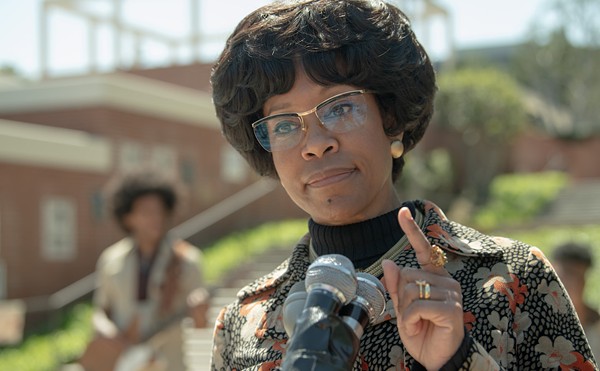These are rewarding questions, as the answers are complex. Radford has made a gripping, highly cinematic adaptation of a gorgeous work of theater, even using a hand-held camera at moments of instability to convey the story's dangerous flirtation with societal collapse. His actors (Al Pacino and Jeremy Irons!) have sunk so deeply into the language that it plays like modern English, only far richer. And the juicy naturalism -- rippling canals, roiling populace, glittering ducats -- makes for a luscious backdrop. Even Portia (Lynn Collins), with her pre-Raphaelite hair and porcelain skin, flaunts a ridge of blond down across her upper lip.
The action begins on the Venetian canals, where the film was shot, and steers us briskly into the tangle of sixteenth-century Venice. At that time, Jews were forced to live in a walled ghetto, forbidden from owning property and spat upon as the usurers they had to become. None of these details is in Shakespeare's text, though it is between the lines; by making the politics explicit in a prologue, Radford tips his hand before the film has begun. That's a bit of a shame, but his compassion is not. Shylock is a difficult man -- mercenary, melodramatic, merciless -- and it's important to taste the bitter meat on which his resentment has fed.
The film's first words come from Antonio (Irons, perfect), the actual merchant of Venice, who can't understand why he's sad. In short order, we are shown: He is in love with Bassanio (Joseph Fiennes), a young "friend" who arrives to request a fortune to woo a woman, the wealthy Portia. The men discuss the matter on a bed, which is clue enough; then there's a kiss. That's overplaying it, but who wants to quibble with an Irons/Fiennes lip-lock? Sexual love between men is never explicit in Shakespeare, but it's often implicit, and Radford's reading is solid. How else to explain the bizarre lengths of self-sacrifice that Antonio undertakes on Bassanio's behalf? Antonio, after all, agrees to be bound by a pound of his own flesh.
That's Shylock's idea. When the friends request a loan, Shylock (Pacino) wants collateral, and nothing but a pound of flesh will do. It's a crude request, terrible in its specificity, and what it says about Shylock is part of the play's point. He hates Antonio, who has spat upon him and called him "dog," but must Shylock exact such vicious revenge? When Antonio's ships do not come in, Shylock demands his flesh -- even as Bassanio rushes in with twice the value of the loan. Is Shylock a sorely wronged victim of anti-Semitism acting from desperation, or is he a wicked man whose thirst for vengeance admits no mercy?
He's neither. Or both. What's amazing about Shakespeare's play, and in turn about this film, is that it allows Shylock his complete humanity. He is a man both forged by circumstance and limited by personality, someone who can fret over his lost ducats more than his lost daughter (she has fled with a Christian suitor) and still command sympathy. Shylock is rigid because he is terrified; he clenches what little he is permitted to possess only because he is so afraid to lose it.
And how does Pacino do? For the most part, he is a marvel -- once you get over the initial shock of Serpico in a prayer shawl. Pacino uses his craggy, battered ethnicity to play up Shylock's difference, adopting a style of speech (aspirated consonants, flat vowels) meant to mimic an Eastern European yeshiva-boy lisp. That's a risky move, but it works, and so does Pacino's choice to go flat at critical moments, when Shylock wearies of the attempt to be understood. Those are infrequent; more often he's alive with furor, rehearsing his own victimization, confronting his tormentors and ultimately delivering a scathing indictment of Venetian law before the people of Venice -- who don't seem to hear it.
There is another plot to this play, of course, though it's not as memorable. Bassanio courts and wins Portia, far away on the bucolic island of Belmont, in what amounts to a romantic comedy. The fairy-tale aspect is overdone (must Bassanio be such a fop?), but Lynn Collins is magnetic as Portia, bringing light and intelligence to one of Shakespeare's most interesting women. As is often the case in Shakespearean marriages, the man is not worthy of the woman, and it's not clear what comfort we might take in their union. Radford seems to know as much. He closes his movie not with the couple headed toward a bed, as it is written, but with two silent scenes of sorrow -- Shylock's daughter (Zuleikha Robinson), alone among Christians, and Shylock himself, alone and destroyed. There, indeed, is the rub.





